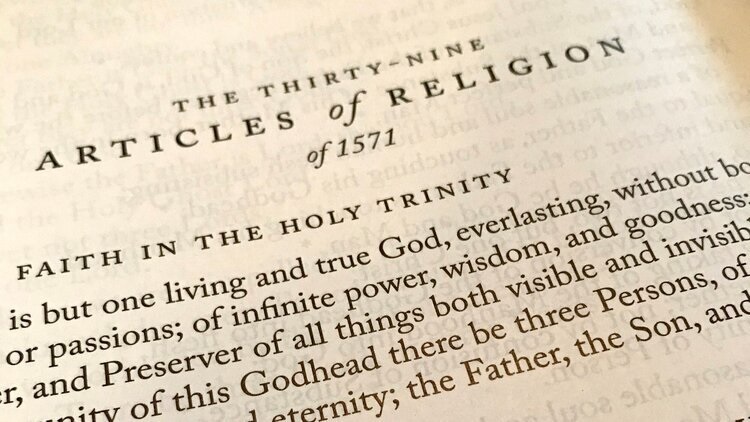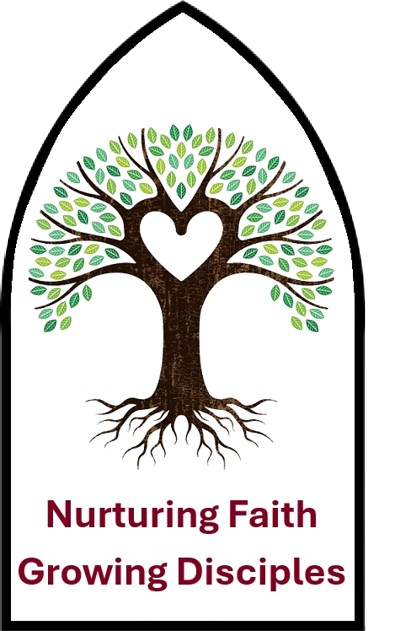
"Anglicanism has always meant going into the unknown with a confidence that our roots in scripture, tradition, and reason will help us through."
(From 'Faith in the Public Square' by Rowan Williams)
Principles of Anglican Theology
The Church of England is part of the One, Holy, Catholic, and Apostolic Church, worshipping the one true God, Father, Son, and Holy Spirit. It professes the faith uniquely revealed in the Holy Scriptures and set forth in the catholic creeds, which faith the Church is called upon to proclaim afresh in each generation. Led by the Holy Spirit, it has borne witness to Christian truth in its historic formularies, the Thirty-nine Articles of Religion, The Book of Common Prayer and the Ordering of Bishops, Priests and Deacons.
Highlighted below are some of the principles of Anglican Theology.
God
We believe, as all catholic Christians do, that there is only one God who exists in three persons: the Father, the Son, and the Holy Spirit. Jesus Christ, the Son, is truly God and truly human, having two natures in one person. After His death, Jesus descended to the dead and proclaimed His victory. Jesus physically rose from the dead, ascended into heaven, and will return to judge all people. The Holy Spirit is fully God and works in the hearts of believers.
Scripture, Tradition, and Reason
We believe the Holy Bible is the primary source of our faith and practice. The teachings and practices of the early Church Fathers and the historical continuity of the Church are highly valued by us. Human reason we believe is used to interpret and understand scripture and tradition, guided by the Holy Spirit.
We believe the Old Testament is also not seen as contrary to the New Testament; both contain God's eternal will for humanity.
The Creeds
We believe the Apostles' Creed, the Nicene Creed, and the Athanasian Creed are true and accurate statements of the Christian faith.
Sin
Sin is any deliberate action, thought, or behavior that is contrary to the character and laws of God. It can be seen as missing the mark or falling short of God's standard of holiness and righteousness. We believe all humans inherit original sin (we are all born with an inherent inclination toward sin), which is washed away through baptism and forgiven by God's grace. Jesus Christ was without sin; but all other humans are sinful and need God's forgiveness. Baptism does not make us beyond sin as all Christians can fall into sin after baptism, but God offers forgiveness if we truly repent. This is Grace, which is the unmerited favor of God. It's through grace that we receive forgiveness for our sins and are empowered to live righteously.
Free Will and Predestination
We believe humans have free will but are incapable of turning to God without the grace of the Holy Spirit. God has chosen certain people for salvation though predestination, and this election is based on His grace, not on our own merits.
God, being outside of time, knows all future events and decisions. Predestination can be seen as God’s foreknowledge of who will freely choose to follow Him. Within this framework, human beings still exercise free will in making choices, but these choices are known by God beforehand. This does not mean that God causes these choices, but He knows them and has a plan that incorporates them. Many theologians acknowledge that the relationship between free will and predestination involves a mystery that is beyond human comprehension. God's ways and thoughts are higher than ours, and there is a level of divine wisdom that we cannot fully grasp.
Justification by Faith
We believe we are justified by faith alone, not by our own works or merits. Good works are the fruit of faith and are pleasing to God, but they do not earn salvation. Salvation is found only through Jesus Christ. The belief in purgatory and practices related to it are not supported by Scripture and therefore we do not believe in such a thing.
The Via Media (Middle Way)
We seek a middle path between Roman Catholicism and Protestantism, embracing elements of both traditions while avoiding any extremes that may exist.
Sacraments
We recognize two primary sacraments instituted by Christ: Baptism and the Eucharist. We also acknowledge other rites and ceremonies such as Confirmation, Ordination, Marriage, Confession, and Anointing of the Sick as sacramental. The effectiveness of the sacraments does not depend on the moral character of the minister.
Baptism is a sign of new life and admission into the Christian community. It should be administered to all, including infants. The Lord's Supper is a sign of Christ's body and blood, given for the nourishment of our souls. It is more than a memorial but does not involve a physical change in the bread and wine. Communion is given in both kinds: bread and wine.
Liturgical Worship
Worship is liturgical, following a set pattern. It emphasizes the beauty and reverence of worship, often with a balance of word and sacrament. We believe all services should be conducted in a language understood by the people.
Inclusivity and Comprehensiveness
We believe in inclusivity and comprehensiveness, allowing a wide range of theological and liturgical expressions within the bounds of the core beliefs of Anglicanism.
We also seek unity with other Christian denominations and are active in ecumenical dialogues.
Social Justice and Action
We are committed to social justice and the practical outworking of faith in caring for the poor, oppressed, and marginalized.
Moral Theology
Our moral theology emphasises ethical living based on scripture, reason, and tradition, with a focus on love, justice, and compassion.
